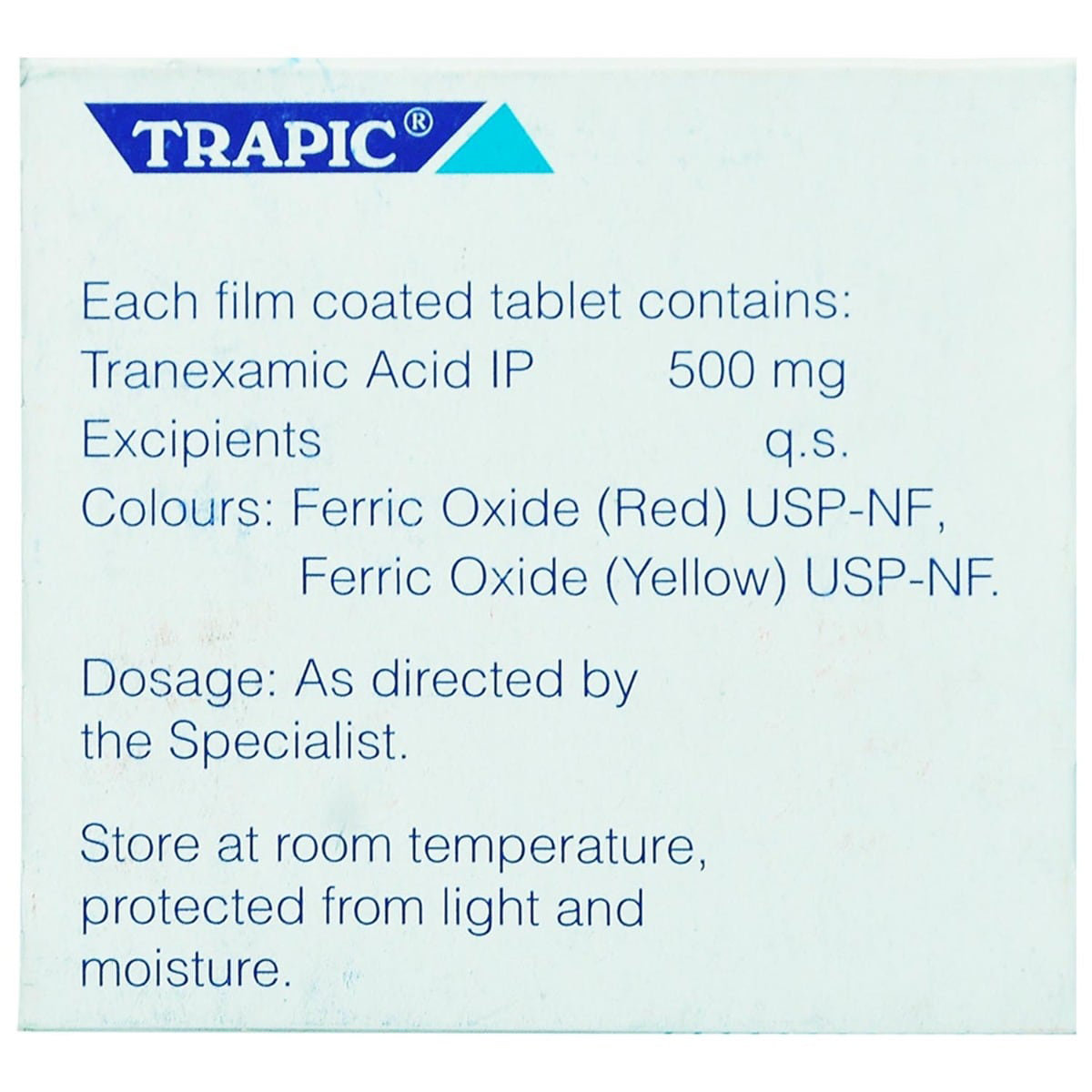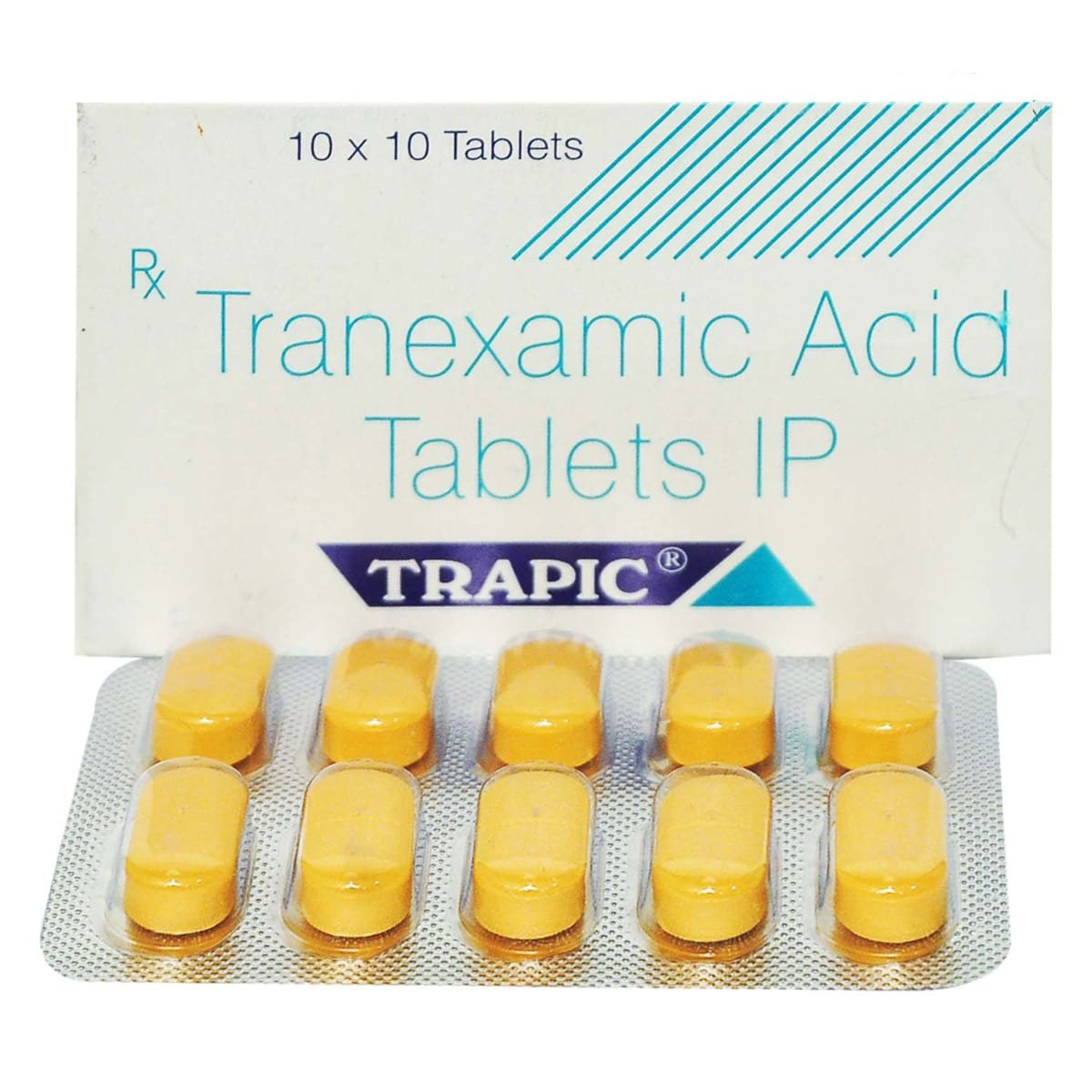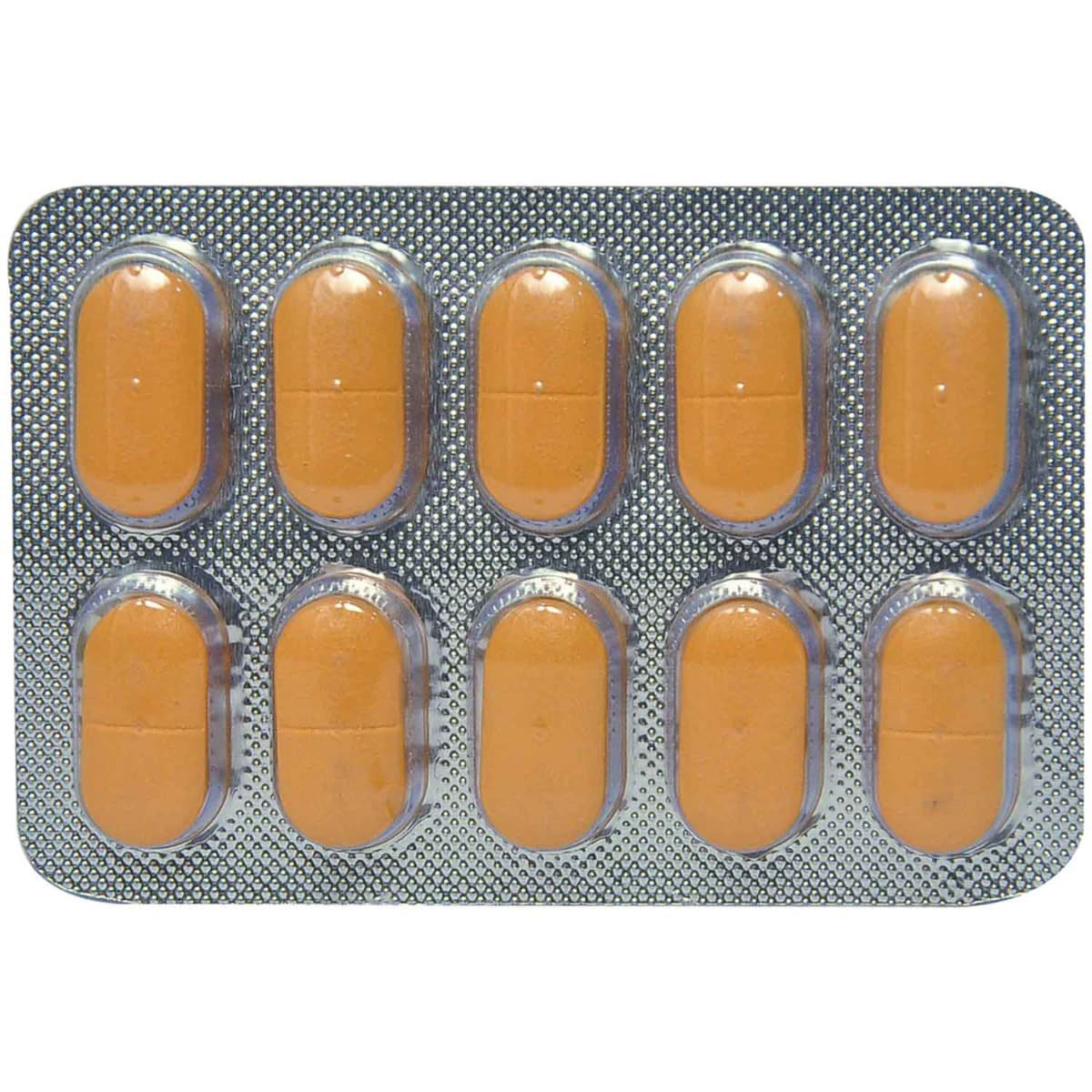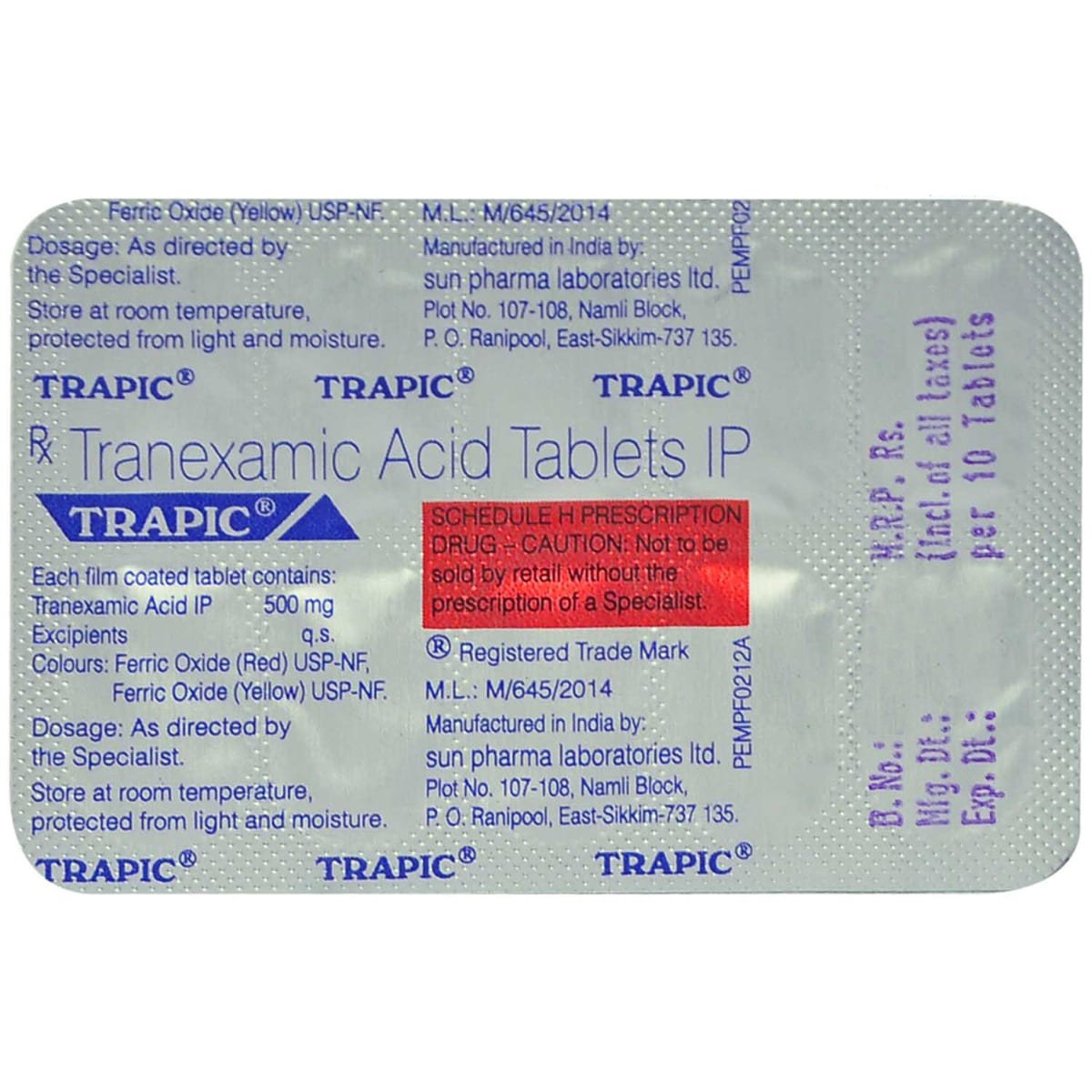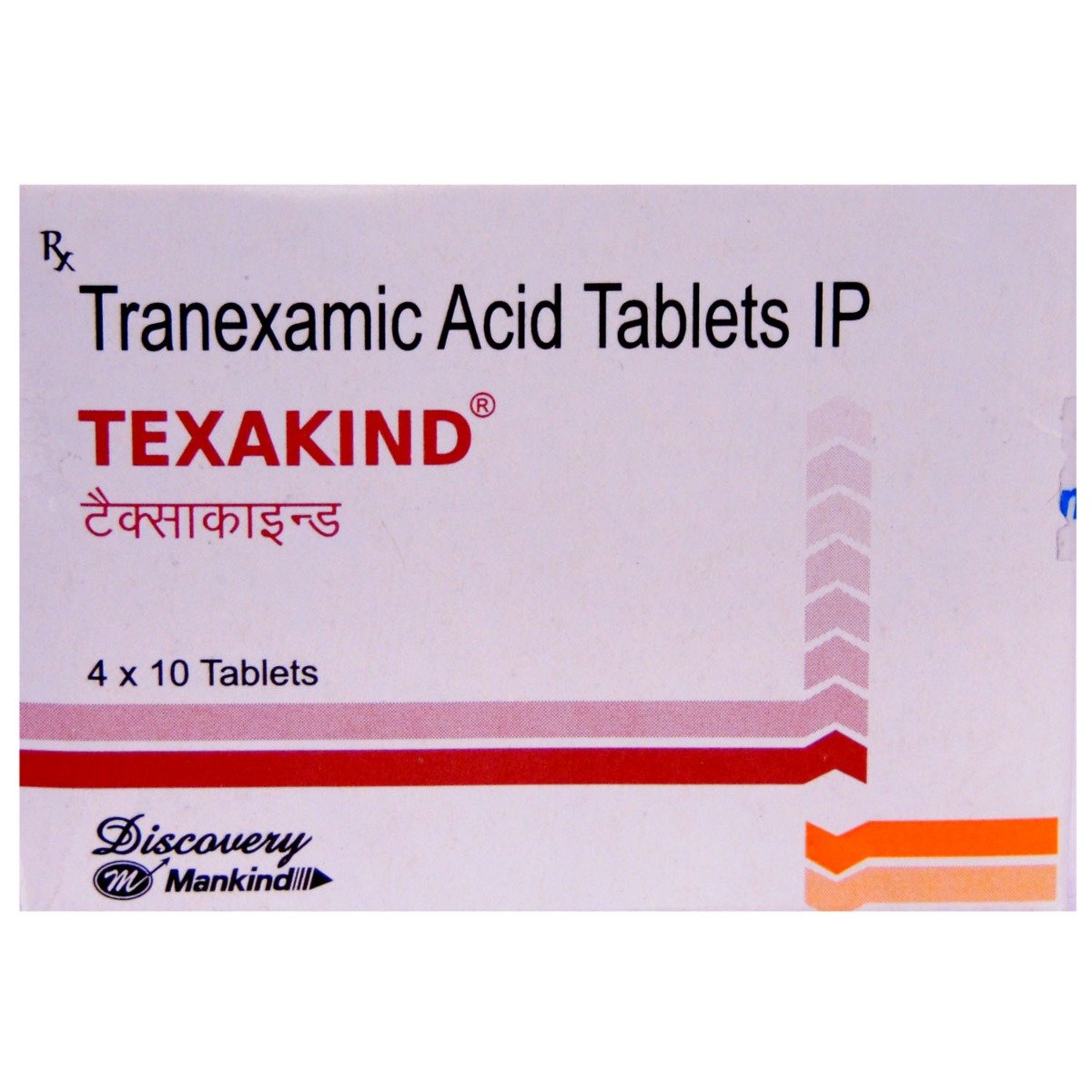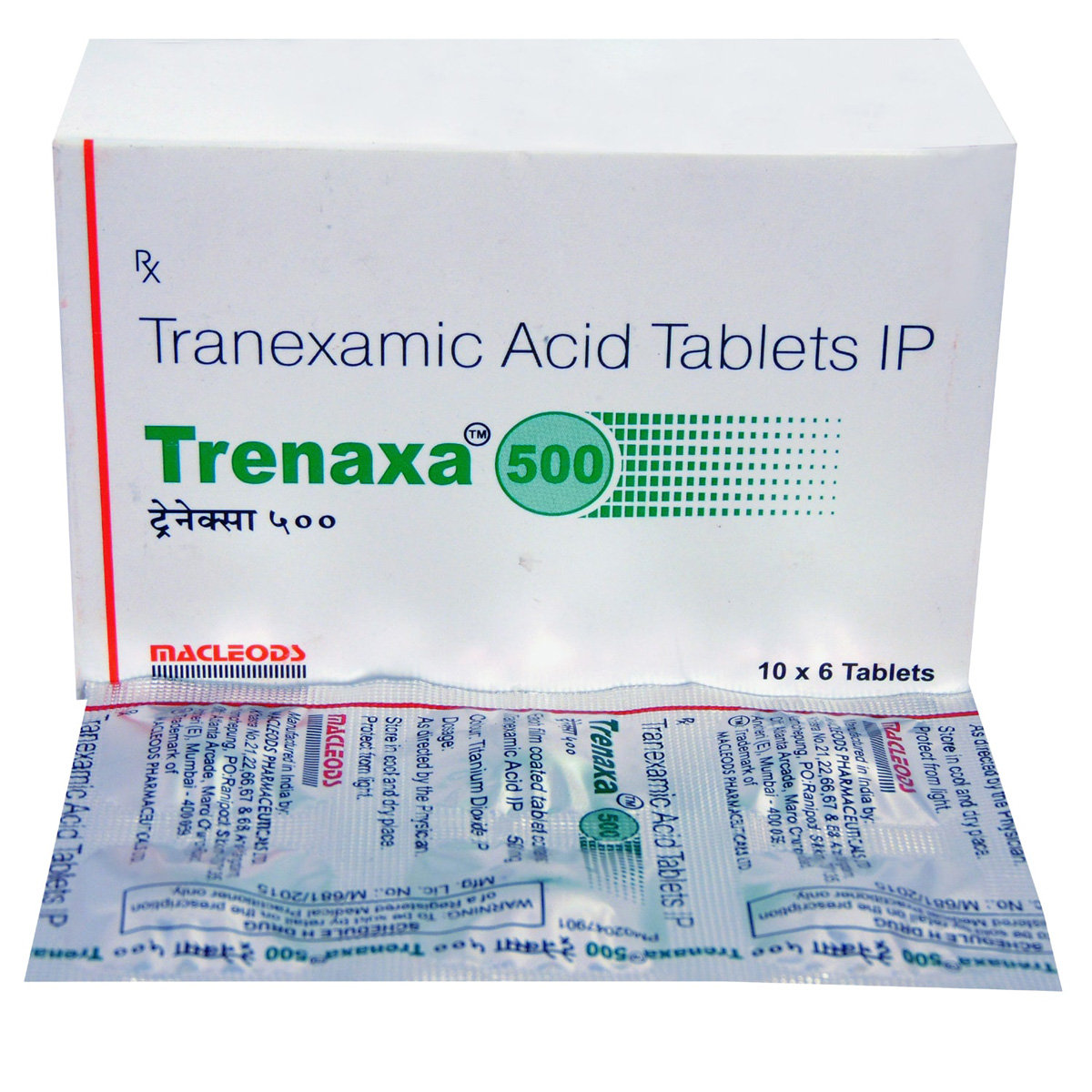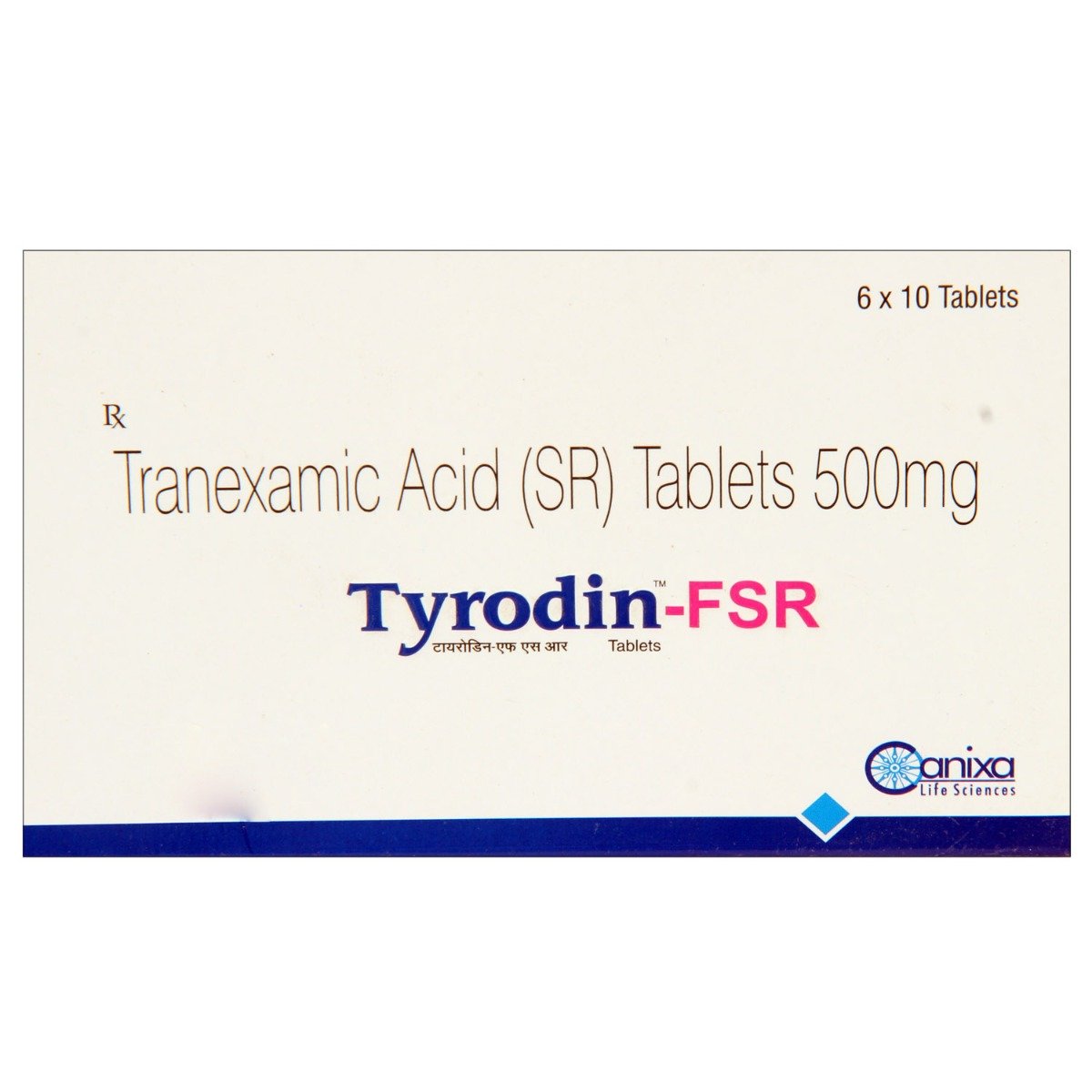Trapic Tablet 10's
MRP ₹198
(Inclusive of all Taxes)
₹29.7 Cashback (15%)
Know Your Delivery Time
Provide Delivery Location

Secure Payment

India's Most Trusted Pharmacy

Genuine Products
Composition :
Manufacturer/Marketer :
Consume Type :
Expires on or after :
Return Policy :
NPPA :
About Trapic Tablet
Trapic Tablet is used to treat abnormal or unwanted bleeding. It is used to control bleeding in conditions such as heavy periods, nose bleeds (epistaxis), cervical surgery, prostate surgery, bladder surgery (post-cystectomy), bleeding inside the eye (traumatic hyphaema) and a hereditary disease called angioneurotic oedema (HANO).
Trapic Tablet contains ‘tranexamic acid’, which acts by regulating the breakdown of blood clots. It blocks the release and action of plasmin, an enzyme essential for the breakdown of clots present in the blood.
Some patients may experience certain side effects, such as feeling sick (nausea), diarrhoea, and itchy skin. These side effects usually go away on their own. If you develop any other serious side effects, such as vision problems, while using Trapic Tablet , consult your doctor immediately.
Trapic Tablet should be taken as advised by your physician. The dose and duration of the medicine will be decided by your doctor based on your health condition. Do not chew, crush, or break the medicine.
Trapic Tablet should be avoided if you are allergic to it or if any other ingredients are present in it. Do not take this medicine if you have a history of kidney disease, thrombosis (formation of blood clots in the blood vessels), disseminated intravascular coagulation (a disease where blood clots form throughout your body), or seizures (fits). Inform your doctor if you are pregnant, planning to become pregnant or breastfeeding.
Uses of Trapic Tablet
Trapic Tablet is used in the treatment of abnormal heavy bleeding. The detailed uses of Trapic Tablet are as follows:
- Menorrhagia Management: Trapic Tablet is commonly used to manage heavy menstrual bleeding (menorrhagia) in women, helping to regulate menstrual flow effectively.
- Trauma Treatment: Trapic Tablet may be prescribed for individuals experiencing trauma to help control bleeding during and after the incident.
- Endometriosis Treatment: Trapic Tablet is effective in reducing heavy bleeding linked to endometriosis, offering relief from associated symptoms.
- Bleeding Disorders Aid: Trapic Tablet is also recommended for certain bleeding disorders, aiding in the prevention and reduction of bleeding episodes.

Have a query?
Directions for Use
- Trapic Tablet can be taken with or without food.
- It is usually taken 2-3 times a day or as prescribed by your doctor.
- Swallow Trapic Tablet as a whole with a glass of water.
- Do not crush, break, or chew it.
Key Benefits
- Trapic Tablet contains ‘tranexamic acid’, which belongs to the class of ‘anti-fibrinolytic agents’.
- It acts by regulating the breakdown of blood clots in the body.
- It blocks the release and action of plasmin, an enzyme essential for the breakdown of clots in the blood. This effect helps to slow down abnormal bleeding.
- Trapic Tablet is generally used for short-term treatment of bleeding.
How Trapic Tablet Works
Storage
- Drink water or other clear fluids.
- To prevent worsening of pain, limit intake of tea, coffee, or alcohol.
- Include bland foods like rice, toast, crackers, and rice in your diet.
- Avoid lying down immediately after eating as it may cause indigestion or heartburn.
- Avoid acidic and spicy food as it may cause indigestion.
- Talk to your doctor about your back pain and potential medication substitutes or dose changes.
- Try yoga or Pilates and other mild stretching exercises to increase flexibility and strengthen your back muscles.
- To lessen the tension on your back, sit and stand upright and maintain proper posture.
- To alleviate discomfort and minimize inflammation, apply heat or cold packs to the afflicted area.
- Under your doctor's supervision, think about taking over-the-counter painkillers like acetaminophen or ibuprofen.
- Make ergonomic adjustments to your workspace and daily activities to reduce strain on your back.
- To handle tension that could make back pain worse, try stress-reduction methods like deep breathing or meditation.
- Use pillows and a supportive mattress to keep your spine in the right posture as you sleep.
- Back discomfort can worsen by bending, twisting, and heavy lifting.
- Speak with a physical therapist to create a customized training regimen to increase back strength and flexibility.
- Include omega-3 rich foods like fatty fish, ground flax, flaxseed oil, and walnuts.
- Consume calcium-rich dairy products for bone health.
- Eat green and leafy vegetables for essential nutrients.
- Include lean protein sources like eggs and whole grains.
- Use herbs and spices for added flavor and nutrition.
- Choose fortified foods for extra nutritional benefits.
- Get plenty of sleep for overall health and well-being.
- Hydrate your body: Drink enough water to prevent dehydration and headaches.
- Calm Your Mind: Deep breathing and meditation can help you relax and relieve stress.
- Rest and Recharge: Sleep for 7-8 hours to reduce headache triggers.
- Take rest: lie down in a quiet, dark environment.
- Cold or warm compresses can help reduce tension.
- Stay Upright: Maintain good posture to keep symptoms from getting worse.
- To treat headaches naturally, try acupuncture or massage therapy.
- Over-the-counter pain relievers include acetaminophen and ibuprofen.
- Prescription Assistance: Speak with your doctor about more substantial drug alternatives.
- Severe Headaches: Seek emergency medical assistance for sudden, severe headaches.
- Frequent Headaches: If you get reoccurring headaches, consult your doctor.
- Headaches with Symptoms: Seek medical attention if your headaches include fever, disorientation, or weakness.
- Lie down or take a nap in dark and quiet room.
- To avoid dehydration, drink plenty of fluids.
- In case of mild to moderate migraine, you can take over-the-counter pain relievers like paracetamol or ibuprofen.
- Apply an ice pack or cool cloth on your forehead.
- Try relaxation techniques such as yoga, meditation, or deep breathing to reduce stress and relax.
- Avoid foods and drinks that trigger migraine such as chocolate, alcohol, cheese, caffeine, processed meats, artificial sweeteners and dried fruits.
- Manage your stress by eating healthy, exercising and a regular sleep schedule.
What if I have taken an overdose of Trapic Tablet
Drug Warnings
- Trapic Tablet should be avoided if you are allergic to it or if any other ingredients are present in it.
- Before taking Trapic Tablet , inform your doctor if you notice blood in your urine (except during periods) or have a history of uncontrollable bleeding, disseminated intravascular coagulation (DIC), irregular periods, or kidney disease.
- Also, inform your doctor if you or your family has a history of thrombosis (formation of blood clots in the blood vessels).
- Let your doctor know if you are taking medicine to treat a hereditary disease called angioneurotic oedema (HANO) every day for a long time.
- Your doctor may advise regular eye tests and blood tests to check your vision problems and also liver/kidney functioning.
- Inform your doctor if you are using birth control pills, including the patch, vaginal ring, and an intrauterine device (IUD), as there is a risk of deep vein thrombosis (a condition in which a blood clot is formed in the deeper vein, mostly the legs).
- Inform your doctor if you are using fibrinolytic agents (drugs that break blood clots) such as streptokinase, as they may stop the effect of Trapic Tablet .
- Inform your doctor if you are pregnant, planning to become pregnant or breastfeeding.
Drug-Drug Interactions
Drug-Drug Interactions
Login/Sign Up
Taking Medroxyprogesterone acetate with Trapic Tablet may increase the risk of blood clots.
How to manage the interaction:
Taking Medroxyprogesterone with Trapic Tablet is not recommended but can be taken if prescribed by a doctor. Consult your doctor immediately if you experience symptoms such as chest pain, shortness of breath, coughing up blood, blood in the urine, sudden loss of vision, and pain, redness, or swelling in your arm or leg. Do not stop using any medications without talking to your doctor.
Taking Ethinylestradiol with Trapic Tablet may increase the risk of blood clot formation.
How to manage the interaction:
Taking Ethinylestradiol with Trapic Tablet is not recommended, as it can lead to an interaction, but can be taken if a doctor has prescribed it. However, if you suffer from chest discomfort, shortness of breath, blood in the urine, blood in the cough, sudden loss of vision, and pain, redness, or swelling in your arm or leg, consult doctor immediately. Do not stop using any medications without talking to a doctor.
Taking drospirenone with Trapic Tablet may increase the risk of blood clot formation.
How to manage the interaction:
Taking Trapic Tablet with Drospirenone is not recommended, as it can lead to an interaction but can be taken if prescribed by the doctor. However, If you suffer from chest discomfort, shortness of breath, blood in the urine, blood in the cough, sudden loss of vision, and pain, redness, or swelling in your arm or leg, consult your doctor immediately.
Taking Levonorgestrel with Trapic Tablet may increase the risk of blood clot formation which can lead to serious conditions such as heart problems and kidney failure.
How to manage the interaction:
Taking Trapic Tablet with Levonorgestrel may leads to an interaction but can be taken if prescribed by the doctor. However, if you experience chest pain; shortness of breath; coughing up blood; blood in the urine; sudden loss of vision; and pain, redness, or swelling in your arm or leg, consult the doctor immediately. Do not stop using any medications without talking to a doctor.
Co-administration of Trapic Tablet may cause blood clotting when taken with Etonogestrel.
How to manage the interaction:
Taking Trapic Tablet with Etonogestrel is not recommended, as it can lead to an interaction but can be taken if prescribed by the doctor. However, If you suffer from chest discomfort, shortness of breath, blood in the urine, blood in the cough, sudden loss of vision, and pain, redness, or swelling in your arm or leg, consult your doctor immediately.
Co-administration of Diethylstilbestrol with Trapic Tablet can increase the risk of blood clots.
How to manage the interaction:
Taking Diethylstilbestrol with Trapic Tablet can possibly lead to an interaction, however, it can be taken only if a doctor has advised it. If you experience symptoms such as chest pain, shortness of breath, difficulty breathing, coughing up blood, sudden loss of vision, pain, and numbness or weakness on one side of the body contact a doctor immediately. Do not discontinue any medications without consulting a doctor.
Using Trapic Tablet together with norethindrone may increase the risk of blood clots.
How to manage the interaction:
Taking norethisterone with Trapic Tablet can lead to an interaction, however, it can be taken only if a doctor has advised it. If you experience symptoms such as chest pain, shortness of breath, coughing up blood, blood in the urine, sudden loss of vision, and pain, redness, or swelling in your arm or leg, contact a doctor immediately .Do not discontinue any medications without consulting a doctor.
Co-administration of tretinoin with Trapic Tablet may increase the risk of blood clots.
How to manage the interaction:
Taking tretinoin with Trapic Tablet is not recommended due to its increased effects, however, it can be taken only if your doctor has advised it. If you experience symptoms such as chest pain, difficulty breathing, coughing up blood, sudden loss of vision, pain, and numbness or weakness on one side of the body contact a doctor immediately. Do not discontinue any medications without consulting a doctor.
Co-administration of Estradiol with Trapic Tablet can increase the risk of blood clots.
How to manage the interaction:
Taking Estradiol with Trapic Tablet can lead to an interaction; however, it can be taken only if a doctor has advised it. If you experience symptoms such as chest pain, shortness of breath, difficulty breathing, coughing up blood, sudden loss of vision, pain, and numbness or weakness on one side of the body contact a doctor immediately. Do not discontinue any medications without consulting a doctor.
Co-administration of raloxifene with Trapic Tablet can increase the risk of blood clots.
How to manage the interaction:
Taking raloxifene with Trapic Tablet is not recommended due to its increased effects, however, it can be taken only if your doctor has advised it. If you experience symptoms such as chest pain, shortness of breath, difficulty breathing, coughing up blood, sudden loss of vision, pain, and numbness or weakness on one side of the body contact a doctor immediately. Do not discontinue any medications without consulting a doctor.
Drug-Food Interactions
Drug-Food Interactions
Login/Sign Up
Diet & Lifestyle Advise
- Ask your doctor about the exercises you prefer based on your health condition.
- Stay hydrated and consume plenty of fluids. Fluids are necessary to maintain blood flow in your body.
- Consume fresh fruits and vegetables. Consult a dietitian and prepare a diet plan. Eating healthy can help you to recover faster.
Habit Forming
Therapeutic Class
All Substitutes & Brand Comparisons
RX
Texakind Tablet 10's
Mankind Pharma Pvt Ltd
₹159
(₹14.31 per unit)
19% CHEAPERRX
Trenaxa 500 Tablet 6's
Macleods Pharmaceuticals Ltd
₹104
(₹15.6 per unit)
12% CHEAPERRX
Tyrodin-FSR Tablet 10's
Canixa Life Sciences Pvt Ltd
₹176
(₹15.85 per unit)
11% CHEAPER
Alcohol
Safe if prescribed
Trapic Tablet may not interact with alcohol. However, avoid the consumption of alcohol as it may worsen your health condition.
Pregnancy
Consult your doctor
Trapic Tablet is a category B medicine and may not cause toxic effects to the fetus. However, it should be used only when prescribed by a doctor for pregnant women.
Breast Feeding
Consult your doctor
Trapic Tablet should be used in breastfeeding mothers only if prescribed by a doctor.
Driving
Safe if prescribed
Trapic Tablet may cause dizziness. Hence, it is advised to avoid driving or operating machines for some period after taking Trapic Tablet .
Liver
Consult your doctor
Trapic Tablet should be used with caution in patients with liver diseases. Your doctor may suggest a dose adjustment if needed based on your health condition.
Kidney
Consult your doctor
Trapic Tablet should be used with caution in patients with kidney diseases. Your doctor may suggest a dose adjustment if needed based on your health condition.
Children
Safe if prescribed
Trapic Tablet should be used in children under 12 years of age only if clinically needed. The child specialist makes dose adjustments.
Heart
Limited information was available regarding the use of Trapic Tablet in patients with heart problems. Please consult your doctor before using Trapic Tablet .
Geriatrics
Consult your doctor
Limited data is available regarding the use of Trapic Tablet in elderly patients. If you have any concerns about the usage of Trapic Tablet in geriatrics, please consult your doctor.
FAQs
Trapic Tablet is used to treat abnormal or unwanted bleeding.
Trapic Tablet is an antifibrinolytic agent that can stop the bleeding effectively. It stops the breakdown of blood clots by inhibiting the action of plasmin (an enzyme essential for the breakdown of blood clots).
Trapic Tablet should be used temporarily to control bleeding. Do not use it frequently or for a long time without consulting your doctor.
Trapic Tablet cannot stop periods. It can only reduce the bleeding in cases of heavy bleeding. However, do not use this medicine for any indication without consulting your doctor.
Trapic Tablet should not be taken with birth control pills, including the vaginal ring, intrauterine device and the patch, as there is a risk of ‘deep vein thrombosis’ (formation of a blood clot in the deeper vein, mostly legs). So, inform your doctor before taking Trapic Tablet , if you are taking any birth control pills.
Trapic Tablet may not affect fertility. It is used to stop abnormal bleeding during heavy periods. Inform your doctor before using this medicine to avoid any unwanted side effects.
Trapic Tablet can be used in children with caution. Your doctor may make dose adjustments based on the age, weight and health condition of your child.
Trapic Tablet may cause side effects such as nausea, diarrhoea and itchy skin in some patients. If these side effects persist or worsen, please consult your doctor.
Take Trapic Tablet as advised by your doctor. Make sure you take Trapic Tablet at the same time every day for better results.
You should take Trapic Tablet as per the dose and frequency prescribed by the doctor. Depending on the condition it is being taken for, different people require different dose and frequency of this medicine. Do not take more than the recommended daily dose by the doctor.
Yes, the use of Trapic Tablet can cause diarrhea. In such cases, drink plenty of water or other fluids. If this condition persists or worsens, consult your doctor. Never take any other medication without consulting a doctor.
No, taking a higher than the recommended dose may not be more effective, rather it may increase the risk of toxicity and serious side effects. If your symptoms are not relieved or there is an increased severity of your symptoms after using the recommended doses, please consult your doctor.
Store Trapic Tablet in a cool, dry and dark place. Protect from direct sunlight. Keep it out of reach of children.
Country of origin
Manufacturer/Marketer address
Disclaimer
Author Details
We provide you with authentic, trustworthy and relevant information
Recommended for a 30-day course: 6 Strips

